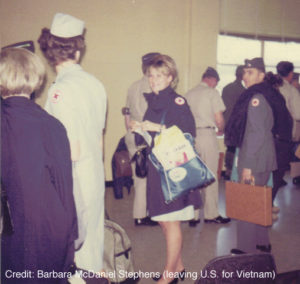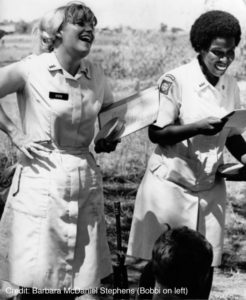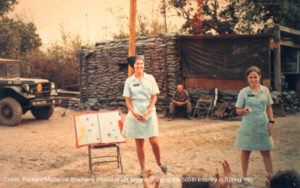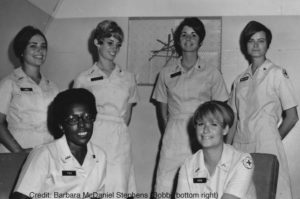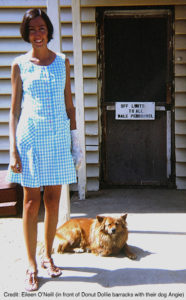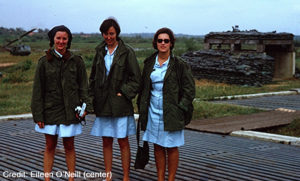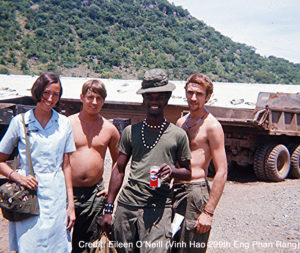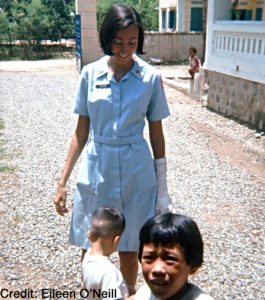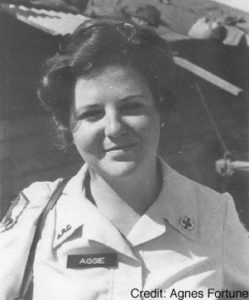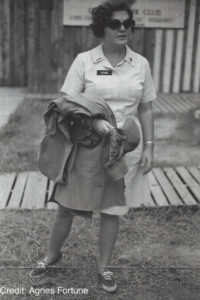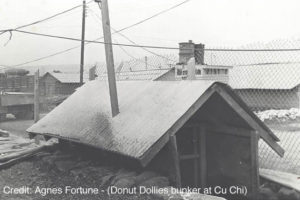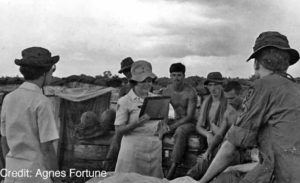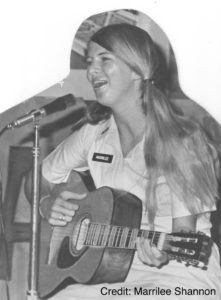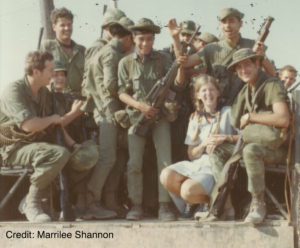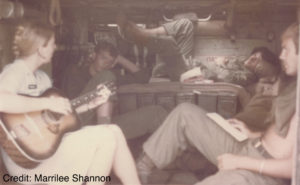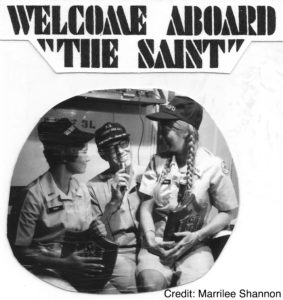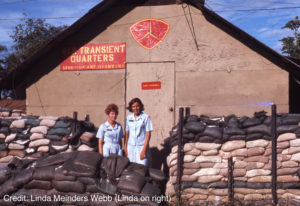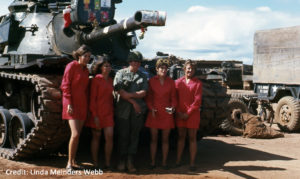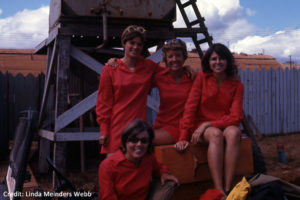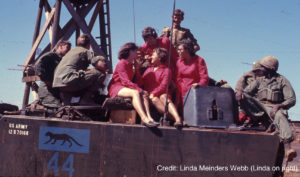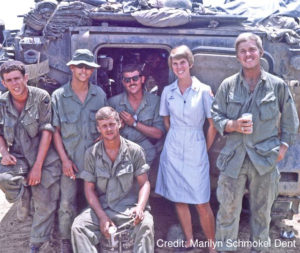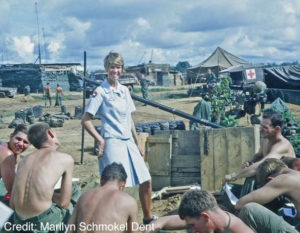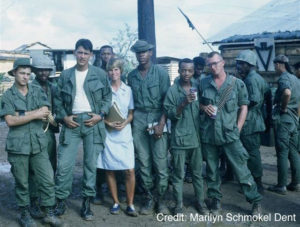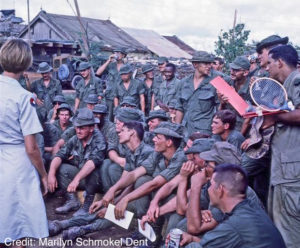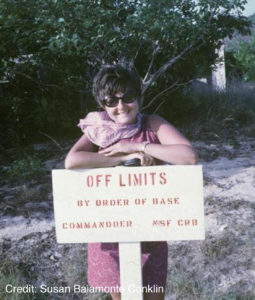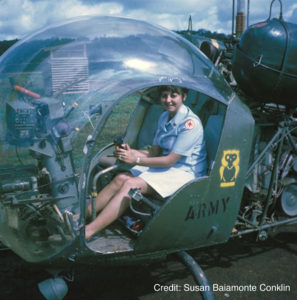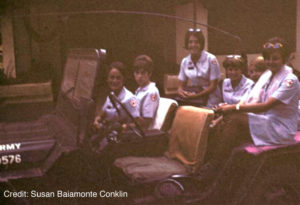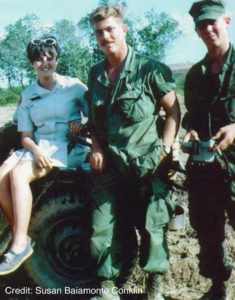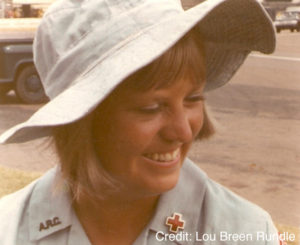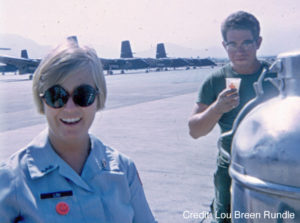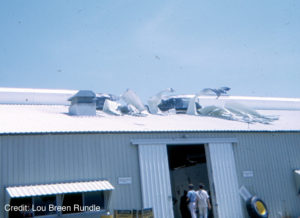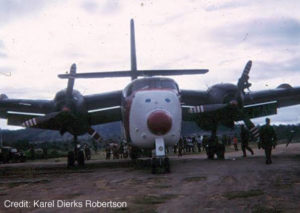In our sixteenth edition of the Donut Dollie Detail, Terre Deegan-Young tells how her decision to go to Vietnam was for adventure and to help make up her mind about the war, how her work was both challenging and gratifying, and how in the heat of war she saw young, brave soldiers go from “boys to men” right before her eyes.
Please share the Donut Dollie Detail with family, friends and veterans you may know, and make sure to like/follow us on Facebook to learn when the next edition is posted. You can also share your email address with us at list@donutdollies.com for updates on the upcoming release of the Donut Dollies Documentary (we will not share/sell your email and will only use it for Donut Dollie related updates).
Please meet Red Cross Donut Dollie Terre Deegan-Young…
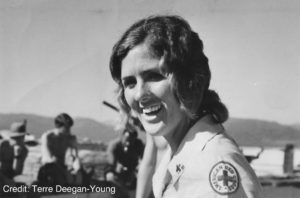 What prompted you to join the SRAO (Supplemental Recreation Activities Overseas) and want to go to Vietnam?
What prompted you to join the SRAO (Supplemental Recreation Activities Overseas) and want to go to Vietnam?
I was in college in the late 60’s. The war was all over the news including Kent State. My father had served in WWII and was a pilot at the time for the Illinois National Guard. So, I was getting “opinions” from both sides – he was pro the war and military, my college friends were all against our actions. I wanted to go over there for myself and make up my OWN mind. I knew my outspoken personality would NEVER fly in the military, but heard about the Red Cross program. It seemed like the perfect solution. Plus it filled my desire to do some sort of an “adventure”. The prospect of college – marriage – motherhood, in that order, just didn’t fit for me. I saw that path years down the road. But Women’s Lib was just beginning and I was all for the choices we would/should have.
When and where were you stationed in Vietnam? Did you go by a nickname?
I was in Vietnam from Fall of 1970 until summer of 1971. I was first stationed in Chu Lai with Americal Division. Stayed there till after the holidays in December of ’70 until I was sent down south to Bien Hoa with the 1st Cav. I believe I was there from about January until March or April of 1971. I then went back north to Camp Eagle with the 101st. My legal name was Therese, but I always just went by “Terre”.
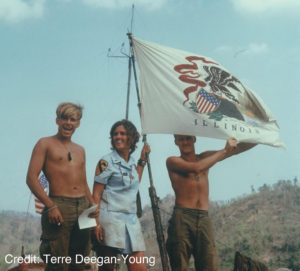 What was a routine day like in Vietnam?
What was a routine day like in Vietnam?
I think the question of “routine” day would be close to impossible for any Donut Dollie to answer. That was the challenge (and beauty) of this job. NOTHING was routine. You would always have some obstacle to overcome while trying to do your job… a helicopter would be late, weather would delay your departure, the guys you were supposed to visit wouldn’t have returned to that particular firebase, there would be some dignitary there and the generals would want you to “play” hostess or something to these people, etc., etc.
If I could attempt to make any day ‘typical’, at least for me, it would be to rise very early as most chopper rides wanted you out on the pad around sunrise. You get your partner for the day (never traveled alone) and what “program” you had decided to use all day. You made sure you had some goodies to give out, especially “short-timer” calendars, which they all loved. And off you would go, hopefully with a little breakfast in you. It was always cold at first, so you have your trusty field jacket on while you waited at the pad. With any luck, the ride you arranged the night before would show up. You confirm that they are headed to the firebase you need to visit. And off you go.
At the base, you check in with one of the high ranking officers. You confirm which groups you want to visit with – trying to get to all of them if possible. This would usually include the artillery guys, the transportation guys, maybe support groups like mess hall, etc. And the most important, only because we could only catch them periodically, was any infantry group that was on a “stand down” back at the firebase at the time. Sometimes, if it was a big group, you would see them by platoon. Of course all of this depended on the numerous schedules of these various groups. So, being flexible and a good “suck up” was key to seeing as many as possible in your one day. If it was a small outpost, you sometimes scheduled a “lunch” pick up and headed to another base just to fill the day.
You would have various luck depending on the group. Some were very welcoming, some just wanted to talk and NOT do the program (which was fine), some wanted their officers to attend, others wanted time just with us so they could vent, and some were VERY tired from other duties and were a bit upset we were there – but that was rare. Again, flexibility was key – evaluating each group to give them what they needed, NOT what we expected to present. Some LOVED the games/programs and hated to see us end. Others really wanted only the contact and a “taste of home”. Most wanted to spoil us with whatever food might be a special treat, especially if they had just been resupplied with soda or other treasures not normally available.
After a full day, you drag your program bag and your tired, hot and dirty self, to the pad and PRAY that a helicopter will pick you up, especially if there are storm clouds filling the sky. At least once a week, you have to ask the radio guys to just put out a “full on request for any chopper in the area” to come and get you. Often the one that you carefully scheduled for this had been sent on to a priority job other than providing you a ride home. As you climbed aboard, you could count on a few guys watching you take off… and you would extend your hand out the door with a peace sign to be returned by the same special gesture from them as a way of saying “until next time” and a wish for all of us.
After a much needed shower, you either started creating a “new” program, or scheduling all your runs for the next day, or answering some silly question from the higher ups in Saigon, you never knew (I was the program director in Bien Hoa and Unit Director at Camp Eagle, so I often had administrative duties to handle at end of the day). Other nights, you were “required” to attend a special officer’s dinner or award ceremony or whatever. And you would always do this, as it really helped with relations and you getting the services you needed to preform your job. At least once or twice a week, there was a fun event so you could just relax with some guys that invited you over or you go hear a visiting band… depending on your energy level and interest.
Footnote: I always worked with units that did a LOT of firebase work (and I loved this). So, I never really spent much time at any Red Cross recreation centers (Bien Hoa was only place I ever worked that had one on base). I LOVED flying, so I always got assigned to those duties. And when I was in charge of the schedule, I would make it work out that way.
Did you ever have any “close calls” either on base or in any vehicles?
Occasionally being told when flying that someone was “shooting at us”, but I never could hear anything. Once, we got caught by weather out at one of the battalion bases of 1st Cav. There was just NO way a chopper could come get us. Since it was a bit more equipped than a firebase, they put together somewhere for us to sleep that night (in an office). The next day was no better and the higher ups really wanted us back at our base so they weren’t responsible. They dressed us in bullet proof vests, helmets, etc. and loaded us all in a jeep. They had gunners in our jeep, in the jeep following us and the one leading. The road was NOT considered secure, so I was a bit freaked until we made the hour or so ride back to base.
Another time, we were at a firebase and the call went out over the PA speakers that we were under attack by the enemy firing from the wire perimeter. We were in the middle of a program and all the guys ran off to their stations to return fire. It wasn’t too serious and over really soon. But for a few moments, we basically were “on our own”. My partner and I just found the lowest hooch we could to crawl into. And, I am now embarrassed to recall… but the soldier that lived there had left his radio on. I immediately turned it off, thinking that if the bad guys get on to firebase, I didn’t want any noise that they would feel they had to investigate and then find us… stupid, I know.
The worst “close call” probably was on Christmas when we were allowed to actually go into the field to visit an infantry group. The commander wanted to bring hot food to any guys that had to be on the front line on Christmas. We were invited to go and help serve. It took about 3 choppers to get all the higher ups, the chaplain and the food out to the various platoons for this company. At one stop, truly IN THE FIELD, we set up and were dishing out tons of treats for these guys. There were probably about 100 of them, so it was a long line and took some time to get them food, ice cream, goody bags, etc. Unfortunately, the landing of 3 choppers and the noise of distribution (even though we were being as quiet as we could) drew attention of the “enemy” and shots were fired into our group. Again, our soldiers reacted on instinct and created a safe perimeter. One captain threw me and other Donut Dollie down and covered us with vests, etc. I was happy for that, as once again my first instinct was to hide behind a PAPER BOX FILLED WITH MILK CARTONS, which was not exactly going to stop a bullet.
I tell both of these experiences to point out something very important and two lessons learned by me.
 1) Both show how little training we all got before we went over there. In neither case were we doing something against the rules. We were just in the middle of “war time activity”. The short two weeks we spent in Washington, DC before going to Vietnam, we left NEVER addressed anything close to what we should do IF this happened. Perhaps it was because the Red Cross is “neutral” on all war activity. But they had to know we MIGHT have to react to these dangers. My memory might be different than other women, but I only remember the training to include how we were supposed to BEHAVE – dress appropriately – not date married men – not curse – Red Cross history – military ranks and what they meant. I do not recall ANYTHING that would have helped me in these situations. I had NEVER even been around guns in my life, that’s how “innocent” we all were to real war and danger and how to respond.
1) Both show how little training we all got before we went over there. In neither case were we doing something against the rules. We were just in the middle of “war time activity”. The short two weeks we spent in Washington, DC before going to Vietnam, we left NEVER addressed anything close to what we should do IF this happened. Perhaps it was because the Red Cross is “neutral” on all war activity. But they had to know we MIGHT have to react to these dangers. My memory might be different than other women, but I only remember the training to include how we were supposed to BEHAVE – dress appropriately – not date married men – not curse – Red Cross history – military ranks and what they meant. I do not recall ANYTHING that would have helped me in these situations. I had NEVER even been around guns in my life, that’s how “innocent” we all were to real war and danger and how to respond.
2) The second “lesson learned” is one that I will take to my grave. For the majority of the time while working in Vietnam, I was “playing” and laughing and entertaining 19 year old (average age) BOYS who were placed in an adult and horrific situation. BOTH times (on the firebase and in the field), these “boys” instantly turned into men right before my eyes. They acted on instinct, on survival and ran to do what they were trained to do. They NEVER held back or cowered. They went right to work. But the real surprise to me was how their faces changed right before my eyes. They really went from looking like your typical teens, innocent and unguarded to looking MUCH older, experienced ‘warriors’, if that is the word. I have never seen such a spontaneous, immediate transformation of human expression and behavior in an instant. And when danger was over, they went right back to the sweet 19 year olds most of them were. I guess I could say that I got to see what war does to someone, since this required transformation probably happened to them almost daily… not good for your emotional health and development at such young age. (Sorry, that was a bit of a commentary from a trained counselor many years later.)
Were you ever injured while in Vietnam?
I fell, tripped or got caught on some of the razor wire that was everywhere over there. It just cut up my thigh a bit, lots of blood, but not much of a wound. Of course, you would have thought I had a fatal gun shot… the medics and all were so very sweet. I have a picture of me in their “hut” with a huge bandage and a big smile on my face from being treated like a queen (like always).
What was it like to visit the soldiers in the hospitals?
Of course, this is where we all got such an appreciation for the nurses that had this most difficult job. The men were all bandaged and cleaned up by the time we saw them. It was certainly one of the harder parts of our duties. We would go bed to bed, visit a bit, give them a short-timers calendar or whatever we had. Most often, it was just chatting or them telling us if they had a “million $$ wound”, meaning they would be sent home because of it. The truly difficult moments were when they would tell us that they lost a limb or the use of one… or some other life changing wound. They would slowly inform us of this (even if it was evident), then ask if we thought their wife/girlfriend or any woman would now find them “less than”. And then they would closely watch our face for our reaction. We had to immediately encourage them that it would basically “be all right” – that they wouldn’t be rejected, that they were loved for who they were, and that hadn’t changed. We had no idea if this was true, but it was what they needed to hear at the time – from an American “round eye” and considering the status they assigned to us because of it. It was heart wrenching to do. But our job was based on hope and on the “real world” they all wanted to return to after this nightmare. (Oops, there I go again.)
How was the transition returning home to the United States?
I didn’t want to come home just yet. I felt I had more to do there and wanted to stay for at least a few more months. It was such gratifying work, I knew I wouldn’t replace it and wanted to get all I could, while I could. But my sister was getting married and my father put LOTS of “Catholic guilt” on me saying it was an important family event and I needed to be there. I really loved my family and wanted to respect his wishes. Especially since I knew my mother sacrificed a lot of “peace of mind” while I was in Vietnam. So, I agreed to leave (it was about a month short of my year-long tour).
I stalled on the journey home, stopping in San Francisco to visit Karen Kent, a fellow Donut Dollie. This was a good move, as she had returned a few months before me, so she could help with the SHOCK of being stateside. I remember we went to a San Francisco Giants baseball game. It put me around more people than I had been exposed to for a very long time. Just going on a pedestrian bridge across a 10 lane highway to get to the game was terrifying. But even harder was that none of the men were taking notice of us!!! Karen just started laughing at me because she knew – as hard as all the attention was for us all that time in Vietnam, especially when you wanted to be invisible and have private time – you did like feeling like a celebrity, or a supermodel, or rock star, etc. You were one of about 10,000 (male vs. female odds). And it was a bit of an adjustment to again be one of the crowd.
Grocery stores were amazing… all that fresh food. People being impatient, worried about trivial things, that was another shock. Did they not know that their problems were so very minor in the scope of the world? I felt like I had been on another planet all this time.
Home was tough, although I didn’t realize it at the time. Getting off the plane and into my mother’s arms, I knew that I was the one that put all those new worry/wrinkle lines on her face. My sister’s wedding kept me busy (and years later she told me she didn’t WANT me at the wedding, afraid I would get all the attention – guess “Father doesn’t always know best”). I “thought” I was doing fine, but I have heard I would just sit and stare often. My family and friends really didn’t know “how” to talk to me, so they never asked. Neither did the general public, as they wanted the whole thing to just go away by that point. And knowing how everyone felt, I never brought anything up. So, I guess, down deep, I was looking for an escape from this “expected” normal life that I was now supposed to lead. When the chance came to hitchhike around Europe with Karen, I jumped at it. I worked a waitress job to earn the money and within 6 months, I was on the road again. Karen spoke “my language”. We even visited MANY of our soldier friends that were now stationed in Europe. So, we sort of “continued” our jobs, just on safer soil. It was what I needed and wanted and eased me back into the “real world”.
When the money ran out and I had to return to reality, it was tough. I did do social work in a dangerous neighborhood in Chicago, probably to keep the “thrill” alive. And then, met a friend of my brother’s that had recently returned from Vietnam and we began to date – sharing that bond and “thinking” it was “love”. Unfortunately, we married building on that one experience instead of what it takes for a lifelong relationship. We moved to Colorado to get away from “the expected” in the Midwest. But we were both still restless and unsettled. So, we “volunteered” to return to Vietnam and work with an adoption agency that was trying to get all the Amerasian children out of the country. Now there is enough there for a WHOLE new story that I won’t include now. Just say that I saw the aftermath of what us Americans “left behind”… angry, scared people, bomb scarred countryside, crumbling economy and more orphans than they could handle. And this was 1975, as the ARVN’S and the government were slowly “giving up”. So daily, we would have to read about firebases, cities, villages where many American lives were sacrificed, all being deserted before the NVA would arrive.
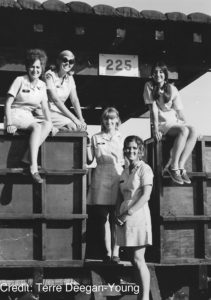 What would you like people to remember and understand most about the women who served?
What would you like people to remember and understand most about the women who served?
Selfless, brave, adventuresome, talented, courageous, hard working, flexible – I could go on and on with adjectives. We are our own breed for sure. There was NEVER a Donut Dollie that I was NOT proud to serve with or work besides. I have at least a half a dozen that are still my closest friends, after almost 50 years. There are no environments or jobs that you could do that would bring you closer, so that these ties all stand the test of time. And to this day, they are doing great things in our world – BECAUSE of the experience, IN SPITE of the experience.
Another thing that people should know and understand… we didn’t charge for sex or go to Vietnam to find a husband, which were only a few of the terrible rumors that I would sometimes hear. Did I know women that dated married men, yes. Did I know women that CHOSE to be intimate with some of the men they were dating, yes. But NEVER was the Donut Dollie program some sort of “big business” opportunity for any of us. I am sure back at home, we could have gotten into that line of work if we wanted and been a hell of a lot safer (and smell better on a regular basis). This “assumption’ is the one I hate the most. Hell, if true, we could all have come home millionaires.
How do you feel Veterans think of your time having served with them? Have any Veterans expressed their feelings to you directly?
My experiences have always been great when I have encountered a Vietnam vet. MOST know what we did and are extremely grateful. It has always been a pleasure to exchange “war stories”. I believe the treatment we all, on some level, received when we returned home has bonded us in a very protective way. Early on, I would not easily share that I was a Donut Dollie or in Vietnam with anyone, as I never knew what the reaction would be. Now, I say it most proudly.
What were your fondest or most interesting memories of your time serving in Vietnam?
I think I have already shared these in my “story”… the interesting way the men went from “boys to men’; how untrained we all were for the job, but we all adapted quickly. I guess I would add that I was treated with upmost respect 99% of the time, even if they were drunk, just returning from weeks in the field, lonely, tired or whatever. I have to say enlisted men in general were more appreciative and gracious. I did see some officers that cared more about their rank (a.k.a. body count), than their men. But I also met many who were very devoted to “their boys” and would use us as sort of spies to see what they could do to make life better for the guys in the field.
If I had to name just two of a million “fond” memories of my time there – I would say that first, the women that I met. AND then, the lessons it taught me about myself and what I am capable of doing. That year – the hardest, toughest, scariest, most challenging, both physically and emotionally that I ever had – was the best year of my life. It influenced every choice, decision, and direction that I took for each year of my life since. I wouldn’t trade if for a thing.
PLEASE NOTE: THERE ARE 15 PREVIOUS EDITIONS OF THE DONUT DOLLIE DETAIL THAT CAN BE SEEN HERE, JUST SCROLL DOWN TO READ EACH (AT THE BOTTOM, YOU’LL SEE A LINK TO GO TO THE NEXT PAGE OF DONUT DOLLIE DETAIL FEATURES)

